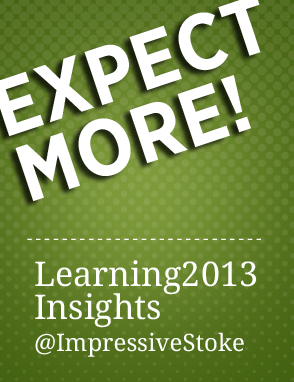Expect More! Learning2013 Insights
 A professor once told me, “The more you learn, the more you’ll learn there is more to learn.” Attending Masie’s Learning2013 conference substantiated the truth of this good man’s word. The speakers thus far have proved to be inspiring and the subject matter presented during the Learning2013 sessions will certainly affect the way we view and implement learning in the future.
A professor once told me, “The more you learn, the more you’ll learn there is more to learn.” Attending Masie’s Learning2013 conference substantiated the truth of this good man’s word. The speakers thus far have proved to be inspiring and the subject matter presented during the Learning2013 sessions will certainly affect the way we view and implement learning in the future.
Some of the topics that have been exciting have included an address by Professor Betsy Sparrow of Columbia University, and Martin Bean of Open University. I don’t claim to be an expert on either subject they presented and perhaps that is why it was fresh and appealing. Along with that thought, considering their ideas and suggestions are necessary as we as learning professionals striving to meet the needs of the learners we are responsible for.
Betsy Sparrow:
A well respected neuroscientist, Dr. Sparrow shared how the internet and other technologies are enhancing our transactive memory, which is “a mechanism through which groups collectively encode, store, and retrieve knowledge”.
The internet is transactive because it allows learners to access knowledge outside of their own expertise by searching for information from those who are “experts”. As the learner repeatedly refers back to the subject matter when they need it, it is committed to memory as they apply the knowledge to a task or problem at hand. Sparrow states that this repetitive look up and application of knowledge is a more effective approach than that of rote learning (memorization by repetition), as it is meaningful to them not simply an exercise in the regurgitation of information that is forgotten soon after.
Martin Bean:
An incredibly energetic fellow, Martin Bean, Vice-Chancellor of Open University gave participants a look into the future of education. With the sheer number of people needing education, Mr. Bean argues that it is impossible to build enough buildings to accommodate them all. Furthermore, the cost for students would render many unable to acquire an education.
A solution that has helped Open University address these issues is through the use of Massive Open Online Course or MOOCs. “A massive open online course (MOOC) is an online course aimed at unlimited participation and open access via the web. In addition to traditional course materials such as videos, readings and problem sets, MOOCs provide interactive user forums that help build a community for the students, professors, and teaching assistants (TAs). MOOCs are a recent development in distance education”.
MOOCs are powerful as they allow learners to develop skills that make them employable by providing the differentiated value that employers look for in a cost effective (Online University has over 11,000 hours of free courses online) manner. Bean believes that the institutions that will survive in the future will provide fantastic outcomes by enrolling and engaging learners in informal learning with platforms that meet the learner where they live. He further believes that opening internal learning courses to the outside will aid in both recruitment and retention.
To accomplish this level of flexible learning, institutions will need to foster collaboration among academia, employers, and corporate learning. Bean emphasizes that this cooperation delivers fantastic results and is the way of the future for education.
As you can see, there is much more that can be written. We have an exciting future in the realm of learning. In subsequent blogs, my coworkers will provide their insights from Masie’s Learning2013 conference. After reading them, I believe you will agree that we have much to look forward to.





